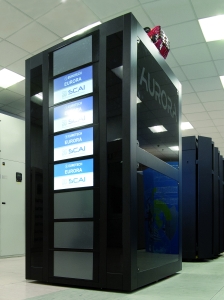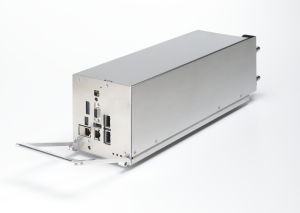Exascale systems are certainly the current buzz in high performance computing. While theoretical projections suggest the possibility to have an exascale system by 2018, reality tells us that a usable supercomputer of that size will require at least few years into the next decade. Simply adopting the current approach – more of the same but bigger and faster – will not work, due to constraints in power availability, cost and scalability of applications. The entire HPC industry has taken very seriously the exascale challenge and a wealth of investments has been deployed in order to overcome what would otherwise be a possible showstopper for the progress in science and technology.
The challenge of building a supercomputer capable of executing exaflop/s calculations is holistic, involving every aspect of an HPC system design, from chip to application. Manufactures and integrators, in particular, have to master many disciplines like computer science, electronics, electrical engineering, mechanical engineering, thermodynamics and even hydraulics.
One HPC system manufacturer that has always nurtured skills and technologies that could prove useful to the exascale challenge is Eurotech, a global supercomputing and  embedded systems company based in northern Italy.
embedded systems company based in northern Italy.
Eurotech HPC division designs and manufactures HPC systems and delivers HPC solutions to a variety of customers. Eurotech makes every part of their HPC systems (boards, interconnects, water cooling, mechanics…) and hence retains the control over the entire system development. These competences, together with a history of successful collaborations with relevant European research institutions, have made Eurotech an ideal partner for exascale research projects.
At Eurotech, they think the big contribution they can give to exascale is taking computer science theory and the best technologies available into systems that are usable and affordable. This is the approach Eurotech has taken in research projects like DEEP and QPACE2, which are at the forefront of the European exascale run.
Both projects aim to develop novel HPC architectures, where accelerators, coupled with low power CPUs or CPU clusters, take the heavy part of the computation, delivering very high energy efficiency results.
“Eventually we aim to get products out of the R&D projects we are involved” – says Giovanbattista Mattiussi, marketing manager HPC at Eurotech – “For instance, in QPACE2 we are applying a new, extremely energy efficient and modular architecture which will provide the base for a new Aurora line. Productizing new technologies and architectures makes them usable and cost effective, so available to everybody”
Eurotech envisages that the combination of novel extremely energy efficient architectures and liquid cooling should provide the grounds to build exascale systems.
Regarding power consumption, Eurotech has always used an “energy aware” approach in their HPC design so that now they manufacture some of the most energy efficient machines in the market. Recently, Eurotech presented a new HPC architecture, based on X-Gene, the Applied Micro ARM 64 bit CPU, with the support for 4 Nvidia Tesla K40. This is an additional step in the direction of higher energy efficiency.
Contact cooling is widely used within Eurotech for applications other than HPC, like embedded computing. According to Paul Arts, R&D director at Eurotech, the competence for cooling and thermal design is far from new in the group. This has allowed the company to develop a sound experience in direct water cooling, taking it through different improvement stages to the new version of the Aurora hot direct cooling, lighter, more compact and more effective.
It is highly likely that future exascale systems will be heterogeneous, including in one system different computation and storage components, like processors, accelerators, FPGAs,  NVMs… This is one of the reasons the company developed the Aurora Bricks, an innovative and modular HPC system that allows composing and configuring different types of HPC servers starting from out of the box components.
NVMs… This is one of the reasons the company developed the Aurora Bricks, an innovative and modular HPC system that allows composing and configuring different types of HPC servers starting from out of the box components.
Also, exascale systems will use so many components, that it will be almost impossible for the whole system to operate without faults. Resiliency, so the ability to recover from faults, will be paramount. As a manufacturer, Eurotech aims to make their systems as much reliable as possible and also providing to applications all information they need to prevent and manage faults. The balance of prevention, system reliability and resilience is the most promising approach for large scale systems fault management.
Eurotech also thinks that technologies for exascale will be leveraged in many systems that won’t necessarily perform at exaflop/s level. Requirements for exascale, like extreme energy efficiency, density, heterogeneity, reliability will also fit many applications where now power, space and performance constraints are preventing feasible solutions. The fact Eurotech has an HPEC (high performance embedded computing) development centre in California demonstrates the will of the company to fulfil a pervasive high performance computing vision.
Building an exascale machine will be most probably possible soon. It is HPC system manufacturers that will have to make that machine affordable and usable. It is the HPC community that will need to develop the programming models needed to support a new generation of parallel applications.



























































